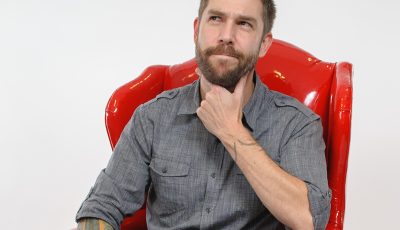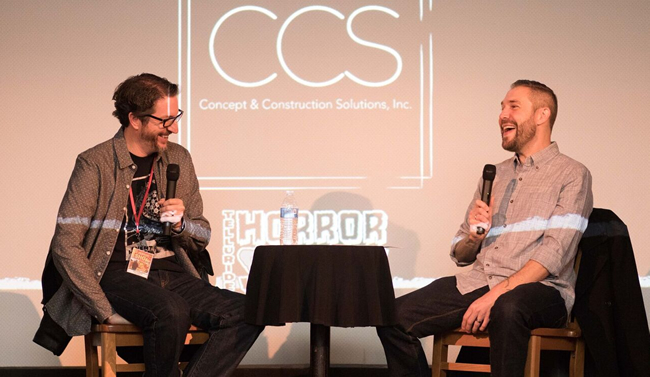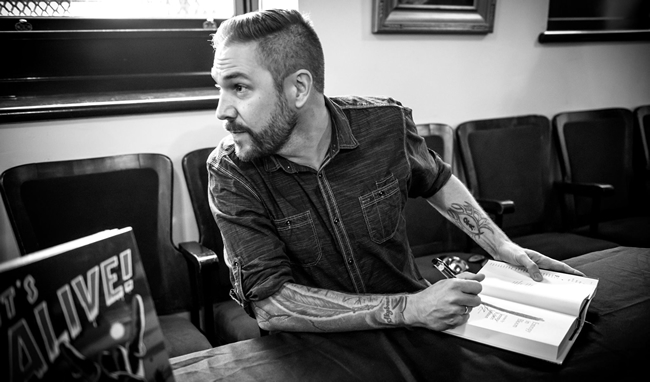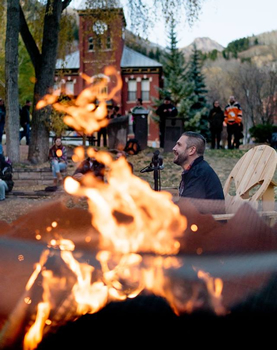

Up Close: Jeremy Robert Johnson
10,000 Excellent Weirdos
There’s plenty to say about Jeremy Robert Johnson’s genre-chomping new thriller, but let’s start here: THE LOOP is the gore-soaked, anxiety-inducing, diabolically funny Richard Linklater/David Cronenberg mashup you never knew you wanted but can’t—or at least shouldn’t—live without.
If that seems like hyperbole, you might have missed the buzz that preceded the book’s September 29th release. THE LOOP earned starred reviews from Publisher’s Weekly, Booklist, and Kirkus, enthusiastic blurbs from horror luminaries such as Brian Keene, Paul Tremblay, and Richard Chizmar, and a legion of fans in the form of early readers.
THE LOOP’s reception is surely gratifying for both Johnson and his longtime literary agent, who responded to an early version of the manuscript with three words: “You did it.” While this is his first release with a major imprint, Johnson is a prominent voice in Bizarro fiction, a genre that’s often described as the literary equivalent of a video store’s cult film section. A 20-year veteran of small presses and literary magazines, he’s best known for his 2015 novel Skullcrack City, a cult favorite and critical success that piqued the interest of editors at major publishing houses. Johnson’s weird star continued to rise with Entropy in Bloom, a short story collection that landed on Book Riot’s Contemporary Horror Top 50 and Barnes & Noble’s Best of Horror 2017 lists. (One story from that collection, “The Sleep of Judges,” is being developed as a feature film, while another, “When Susurrus Stirs,” has been adapted into an award-winning 10-minute short.)
While THE LOOP is poised to be Johnson’s breakout success, his longtime fans (whom he affectionately describes as “10,000 excellent weirdos”) shouldn’t worry that the move to a mainstream publisher has filed down any of his sharp edges. THE LOOP is true to Johnson’s Bizarro roots—it’s a genre that, above all else, wants to entertain you, but it also wants to freak you out a little, and Johnson delivers in spades on both counts. THE LOOP is a literary bear trap; it lures you in with a slow-burn setup and a cast of intensely sympathetic characters before slamming shut on your ankle for a furiously paced, blood-drenched, weird-as-hell second half.
The first chapters feel a little like a John Hughes movie punctuated by bouts of brutal violence. Johnson introduces a trio of lovable teens: Lucy, Bucket, and Brewer, three outsiders in Turner Falls, Oregon, who’ve been quietly tormented throughout their lives by the children of the town’s most privileged residents. When a biotech experiment goes spectacularly wrong, the bullying that Lucy and her friends have suffered takes a nightmarish turn; the kids who were destined to be the Turner Falls homecoming court are transformed into bloodthirsty savages with a physical need to inflict pain and death. Most of the action takes place over the course of one apocalyptic night that begins with Lucy and co. piling into Brewer’s truck to go to a party and ends in a barbaric fight for survival.
In his first-ever interview with The Big Thrill, Johnson talks about the origins of THE LOOP, making the leap from indies to the Big Five, and how the stars magically aligned for his breakout novel—after 20 years of doing the work, building his readership, and honing his craft.
If we were doing this interview in 2022, I don’t think I’d be asking this question because the answer would feel so obvious. But since (I think) you’re not a time traveler, what relevant things were going on in the world when THE LOOP first started to assemble itself in your brain?
I started work on THE LOOP in July 2014, so all the stuff that seems weirdly prescient in the book—the conspiracy theories and disinformation campaigns, the further fragmenting of our country along all possible lines (but especially class and race), and the murderous corporate and governmental overreach—were all simmering nicely. And at the time I was writing the book the way I was using all those elements felt pretty radically absurd. Now the thing plays like a low-key satire.
The outbreak/quarantine aspects in the book have long been thriller defaults, but there are a few other things like the DNA modifying bio-implants and flamethrower drones and sonic weapons that felt kind of speculative at the time of writing and much less so in 2020.
All of which, by the way, brings me zero joy. When I look at the last few years and how they’ve affected all of us on a macro level and my wife and son on the micro level, I definitely wish we could have zigged instead of zagged at some point back in the timeline.
On a similar note, what’s THE LOOP’s origin story? (I’m sorry; I know I’m asking you where you got the idea and that’s, um, not a question writers usually like, but sometimes the answer is fascinating.)
Well, THE LOOP did take a strange path. It started with my agent asking if I’d ever considered writing YA Horror. I told her “Of course” and said that I liked trying out different forms and styles. I viewed it as a challenge, like the genre would provide me with these “Dogme 95”-style restrictions and I’d have to figure out how to make art I was happy with within those rules. [The Dogme 95 movement, spearheaded by Danish directors Lars von Trier and Thomas Vinterberg, proposed a set of strict filmmaking rules that aimed to reclaim cinema’s “traditional values of story, acting, and theme.”]
So she sent me some YA books she’d sold, and I read those and went back and read The Outsiders and Lord of the Flies, and I started outlining the kind of book I wanted to write (which was a small-town, Cronenbergian take on Invasion of the Body Snatchers merged with my love of “kids driving around” films like Dazed and Confused and American Graffiti).
Then, and completely out of left field, an insane indie novel of mine called Skullcrack City became this crowd-pleasing commercial success, and suddenly executive editors at Big Five imprints were asking for more of the kind of thing I’d just written.
So now I had a YA concept and an editorial call for more of the officially crazy kind of work I’d just written—and pretty much inherently produce—so THE LOOP mutated into the strange, unrestricted genre-jumping sci-fi horror coming-of-age conspiracy thriller that it is now.
I have to ask: Is this a really good time or a really bad time to release a book about insidious conspiracies and class warfare and racism and malevolent government and a community that devours itself and neighbors turning on each other and a deadly new virus that no one really understands?
We’ll find out after launch, I guess. On one hand, the book is being positioned as a breakthrough moment in my career, this culmination of a decade of hustling and growing as an author bringing me to the moment where I produce this weird commercial juggernaut that reaches across multiple genres and readerships. Which, you know…no pressure, right? But there are a lot of people who believe in and support me, so for the sake of my old school readers (and agent and editor and especially my wife, who runs everything for our family when I disappear to camp trailers to write), I hope this is a really good time for the book. On the other hand, if it turns out that people have had enough of all the terrible things you listed and THE LOOP is just too emotionally confrontational at a time when we’re all already frayed at the edges…I’d totally understand if this turns out to be a challenging time for the book.
The unexpected upside is that early readers have said they found THE LOOP’s timeliness strangely cathartic, like it’s comforting to experience all this craziness through someone else. I didn’t see that coming, but it’s pretty cool.
Lucy is one of my favorite protagonists in recent fiction. Tell me a little about how she took shape for you.
First, thank you. That’s very kind. And second, that phrasing—“took shape for you”—is really funny because that’s literally how Lucy came to be.
When it was time to jump from the outline for THE LOOP to the first chapter, I found myself in the throes of a vicious writer’s block. I’d just completed two very personal, very dark novellas dealing with our house being burglarized and my near-paralyzing fear of the loss of my son, and my brain was just flattened. And then my wife, who is smart and intuitive in ways I don’t understand, bought me a gift certificate for a sensory deprivation tank place here in Portland [Oregon]. The idea was that I’d meditate on the novel and in the absence of any other stimulus my imagination would kick start and the ideas would flow out of that. I was skeptical as I began my float—I kept bumping against the walls of the tank, the sound of my heart in my ears was driving me crazy, and nothing of Altered States caliber was happening—but after about 45 minutes, the deprivation kicked in, and my consciousness rose out of my body until I was surrounded by luminescent green stars. Then the stars swirled and coalesced into a name: LUCIA.
So that’s how Lucy/Lucia was born. I asked myself about who she was, and where she came from, and I realized that I wanted her to be someone who was capable of great tenderness, who sought a good life, but was denied that by the cruelty of the world around her. And as a result she is someone who is hardened by the world and hides great reservoirs of anger, so the reality of who she is and the desire of who she wishes to be are stretched further and further apart by the events of the novel.

Johnson in conversation with Kelly Link at the 2019 Telluride Horror Show in Colorado Copyright Aurélie Slegers 2019.
The book’s most immediate antagonists are a clique of wealthy teens who become insatiable murderbots due to circumstances mostly beyond their control. But you’re careful to highlight how cruel and even sadistic they were before they became infected. Why was that important?
I think that was important because I feel like we live in a world where there are classes and caste systems and even specific jobs in which psychopaths thrive, and in which their cruelty and neurological disorders have become an asset and have even infected the principles which inform and alter those systems. Worse, those systems—like capitalism or corporate structure—begin to bend us all into something worse. So that sense of disassociation and lack of empathy and sensory-seeking behavior in psychopathy is something I already wanted to write about, and it just gets turned up to 11 after the outbreak infects Lucy’s small town.
(Also, I’m totally just snitching on terrible things I experienced growing up as a sensitive kid in a town where violence and callousness formed a vicious undercurrent. And the funny/not funny part is that I actually dialed the transgressions way, way back.)
There are frequent bursts of humor, but this is a violent, dark book—I can easily imagine mainstream readers being caught a bit off-guard. (Come for the Stranger Things comp, stay for the roaming packs of sadistic torture freaks!) I’m an avid consumer of horror, and there are at least a couple of passages that are going to haunt me for a long time. That said, the most atrocious acts happen off the page. Can you comment on drawing the line between the explicit and the implied?
Yeah—I’ve noticed reviews coming out of non-horror readerships tend to feature an extra warning about the violence. Which, you know…that’s fair. One of the guiding concepts I had going into writing THE LOOP was, “What if Michael Crichton wrote a Splatterpunk novel?” I wanted to recapture that fascination I felt with ’80s sci-fi thrillers, their propulsive nature and futurism, and mix that with the wildness of the Joe Lansdale and Skipp & Spector stuff that blew my mind as a kid. As a result, things get pretty graphic. But there are times where I pull away and leave things implied because I find that actually heightens the emotional impact of the violence in art I admire—people’s imaginations will take them to places far worse, places you can’t guide them to by being “extreme” and typing about viscera and violation ad infinitum.
To follow that thread, THE LOOP belongs to a vein of deeply humane horror that revolves around deeply inhumane acts. I was reminded of Jack Ketchum, and then I got to the acknowledgments, where you thank Dallas. [Jack Ketchum was the pen name of author Dallas Mayr.] What did you learn from him that showed up in THE LOOP?
Dallas understood that the connection to the character was key, and that lesson resonated in all of his work. Even Off Season, which turns into a wildly Grand Guignol cannibal gore-fest, spends the first half of the book rooting you in the minutiae of its characters’ emotions. That way the chaos matters when it hits. It’s that contrast. Dallas would give you moments you could relate to—someone losing their dog, someone worried about the state of their marriage or trying to console a friend—and those connections made the darkness heavier once it came.
I tried to honor that with THE LOOP—I really want people to care about Lucy and her friends so that their ordeal is something you can feel.
Bizarro label aside, do you consider yourself a horror writer?
Sure! I’m proud of the work I’ve done in both those genres. At the same time, I don’t limit myself to any one genre in terms of how I define myself. I just try to write about whatever is fascinating or torturing me at the time in a way that’s interesting to me (and hopefully, by extension, readers). And most of what I write tends to have a very dark streak running through it.
Someday I hope to have written enough, and well enough, that genre doesn’t have to be part of my market consideration. I hugely admire how Joe Lansdale has been able to build that kind of trust in readers, whether he’s writing crime, or horror, or westerns, or anything else. Joyce Carol Oates, too. And I think Stephen Graham Jones is achieving that same kind of magic these days.

Johnson reads a creepy campfire tale at the 2019 Telluride Horror Show. Copyright Aurélie Slegers 2019.
In a talk you gave at the Fractal 10 conference in Colombia in 2010, you explained the correlation between stress and weirdness in pop culture. How has 2020 borne out that theory?
Well, it does feel like we’re in the midst of another weirdness boom (though the horror surge isn’t quite as intense as the one we saw in the 1980s). And it also feels like this growing audience for speculative, strange film and fiction stems from our inability to directly process all of the stress of living through a pandemic, the implosion of a major world government, and the early rumblings of environmental collapse. We need something that isn’t directly about us to show us our fear and anxiety and make it something separate that can be survived or contained or come to terms with—the low-key entropy and weirdness in something like The Beach House, with its primordial parasites and encroaching fog, spoke to my fears in a way that left me with an odd sense of peace. That weirdness is what makes the art just alien enough that we can stand to engage with it directly.
THE LOOP seems like it might be the book that finally introduces you to a larger audience. When did you begin to realize it had that potential?
Honestly, it was when my agent (Mollie Glick at CAA) read THE LOOP and wrote back and said, “You did it. This was worth the wait.” Because she signed me all the way back in 2006 based on the buzz around my collection Angel Dust Apocalypse, and then she very kindly kept me around as her clients and the agencies she worked for got bigger and bigger. Through it all, I kept sending her work that wasn’t quite right for the markets she sold to, and I kept building an audience and platform in the micro-and-small press scenes, and then finally Skullcrack took off, and we had some film options come in, and she pushed me to get that next novel done. But I was nervous when I’d finished the book—it’s not the weirdest thing I’ve written, but it’s definitely intense. So when she finally wrote back and said she was going to take THE LOOP on the market, that she had faith in the thing and would vouch for it, I knew this book might reach beyond my regular audience (which is currently about 10,000 excellent weirdos plus my mom).
Were you prepared for the buzz the book has generated so far?
Not at all. The roll-out has been kind of low-key in the midst of the pandemic, but once we scored the trade trifecta (raves from Publisher’s Weekly, Kirkus, and Booklist), I felt really excited. Then the early reader responses were a lot less divisive than I’d predicted—like you mentioned, this is a violent, dark book—and the predominate take was that this is a wild page-turner and Lucy’s an all-timer of a lead character…I wasn’t prepared for any of that. But it did make me very happy. Hopefully that buzz carries out into the world and people have a great time with THE LOOP.
- Between the Lines: Rita Mae Brown - March 31, 2023
- Between the Lines: Stephen Graham Jones - January 31, 2023
- Between the Lines: Grady Hendrix - December 30, 2022





